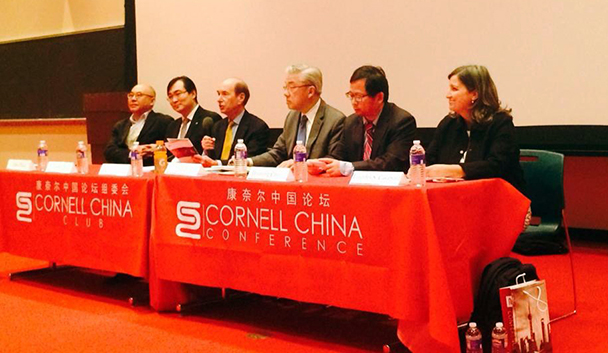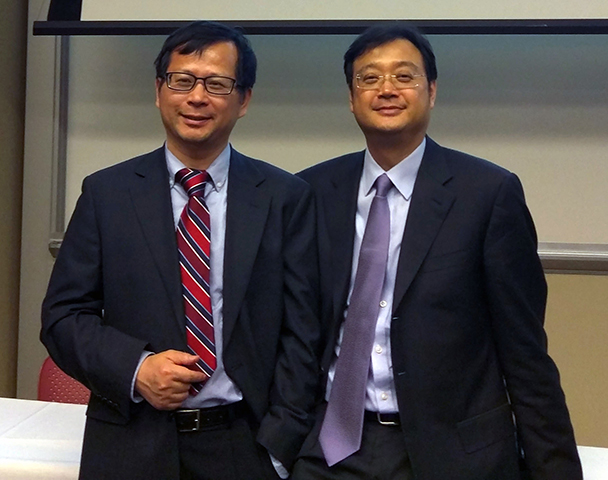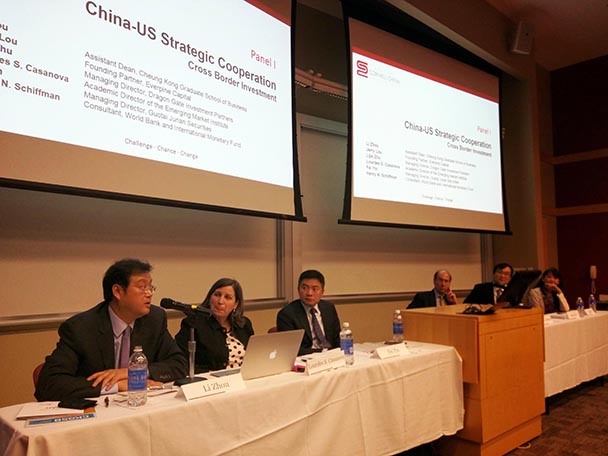Stories of China’s debt, slowing growth and speculative bubbles have dominated the pages of newspapers across the globe. With so much information, it may be difficult to get answers to the important questions: how has the Chinese economy changed over the last couple of decades, and what can investors expect over the next ten years? CKGSB Assistant Dean Zhou Li and Chair of CKGSB’s Finance Department Cao Huining (Henry) recently participated in a panel at Cornell University to discuss these topics and more.

The panel for “A New Normal: China’s Economic Growth Prospects in the Next Decade” at the Cornell China Conference 2015. CKGSB Professor of Finance Cao Huining is second from the right.
Discussing the “New Normal” for China and the US, two CKGSB staff members were among the featured panelists at the Cornell China Conference 2015 on the school’s campus in Ithaca, NY, on April 18 and 19.
The conference, themed “Challenge, Chance, Change”, was the fourth annual forum held by the Cornell China Club to discuss domestic Chinese issues from a global perspective and with an eye towards development. CKGSB served as a strategic partner for the event.
Professor of Finance, Chair of CKGSB’s Finance Department and Faculty Director of CKGSB’s Finance MBA Cao Huining (Henry) participated in the keynote panel titled “ ‘A New Normal’: China’s Economic Growth Prospects in the Next Decade.” CKGSB Assistant Dean Li Zhou shared his insights on a panel discussing “China-US Strategic Cooperation: Cross-Border Investment.”
Both Cao and Zhou are part of the team behind this summer’s upcoming iLEAD program–a unique, cross-cultural, executive education program for next-generation leaders from American, Chinese and international family businesses. A partnership between CKGSB, Cornell University, Next Opportunity Group and US China Partners, iLEAD prepares legacy family leaders as well as other first-generation entrepreneurs for future global success through networking and collaborative learning with modules in both the US and China.

CKSGB Professor of Finance Cao Huning (Henry), left, and CKGSB Assistant Dean Zhou Li were among the featured panelists at the Cornell China Conference 2015 on the school’s campus in Ithaca, NY, on April 18 and 19.
Cao, who earned his Ph.D. in finance from the University of California at Los Angeles and a Ph.D. in pathology from Yale University, contributed to an analysis of the Chinese economy’s move into a “new normal”—a term the Chinese government is using to describe the transition to a slower, but hopefully more sustainable, economic growth structure.
“Over the last thirty years, China has developed very rapidly: ten percent for thirty years,” Cao said. This rapid growth has had drawbacks, including a polluted environment and uneven growth in the population, which has widened the gap between rich and poor.
“This cannot be sustained in the future,” Cao said. “In the future, China will not just rely on hard work, but it will depend more on innovation. We want knowledge and brainpower to be the economy. For that, the financial market will play a very important role, because for innovation to come out and to grow, the innovators have to have incentives from the financial markets to provide a very good exit strategy for innovators.”
The success of a new phone or device, for example, will be determined by how it is trading in the financial markets. That collective body will determine whether the product is good or bad. In addition, the markets will weed out old products that aren’t adapting to the new digital age, Cao said.
Cao also spoke to the differences he foresees between the US and Chinese financial markets. “The US market is rather complete,” Cao said. “In China, it is not.”
For example, Internet-related stocks are very hot right now in China, because there are major opportunities for growth. Another difference between the two markets, Cao said, is that financial know-how in China is still very limited, and so the Chinese market is much more affected by biases based on instinct and emotion. But as more and more people develop financial acumen, the markets will improve. “I think that the next few decades will be a golden age for Chinese financial markets,” Cao said.
Zhou, who is primarily responsible for CKGSB’s global programs and operations and serves as the Chief Editor for CKGSB Knowledge, spoke to the relationship between the US and China in the post-financial crisis of 2008 era. In addressing whether or not China is a threat to the US as a world leader, Zhou reminded the audience, many of whom were from China, that they had all chosen voluntarily to come to the US for higher education.

CKGSB Assistant Dean Zhou Li, left, speaks during a panel discussion on “China-US Strategic Cooperation: Cross-Border Investments” at the Cornell China Conference 2015.
“Almost all the top candidates around the world come to the US for education,” Zhou said, “and that is a power that China does not have yet.” These sorts of “soft powers” as well as the United States’ military power, will keep the US far ahead of China for a long period, Zhou said. “For us Chinese, we must have a realistic picture of what’s really happening, and for those in the US, I think that they need to be more confident in themselves,” Zhou said. “China is not a threat to world leadership in the near future.”
Zhou went on to offer his perspective on how the US should act as a world leader toward China, advising them to lead by example first. “I would suggest the American side set better examples, instead of teaching and lecturing, and never imposing on China, because we all know China has its own long history, its own cultural heritage, its own pride,” Zhou said.
Zhou also encouraged both countries to learn from each other. “There’s more than one way of development in terms of economics and political systems. Leave it to the Chinese to decide which path they would like to take,” Zhou said.
Zhou also discussed what he called “the big knowledge gap” that exists between the two cultures, a lack of understanding of Americans about Chinese culture and vice-versa. “CKGSB and Cornell are working together to help to bridge this knowledge gap,” Zhou said. “We developed the iLEAD program so that it would help the families of both countries to understand each other.”
Zhou urged the individuals in the audience to take it upon themselves to reach out to the other side. “The dialogue between the US and China is too important to be left to the politicians and diplomats. You and I have a responsibility to break the knowledge gap,” Zhou said.
To learn more about iLEAD, visit ilead.ckgsb.info or contact Alan Chen at alanchen@ckgsb.edu.cn or +1-646-627-7735.